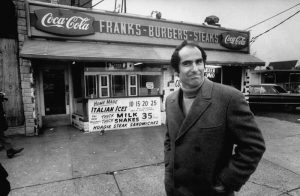 Marco Roth in n+1:
Marco Roth in n+1:
LET’S GET THE STUPID BIT about the shared last name out of the way. It affected me. When a young wannabe, I couldn’t read him, not willingly, not without trepidation, certainly I couldn’t read him well. One overwhelming, brilliant father was enough, thank you. Later, a rueful joke: “Yes, like the novelist, not related,” or dismissive, “Roth, like Henry or Joseph.” Distance, denial, mistrust, a touch of unearned condescension, the attitude of so many writers my generation and a little older, both toward the man and the writer, whether we were tri-state Jews or golden midwest goys, like David Foster Wallace. The feeling was mutual, judging by the books. Men roughly my age, that is of a generation who would have been Roth’s children, had he wanted any, began appearing in his novels throughout the late ’90s and mid aughts. We were a bunch of whiny upstarts, puritans, biographers, journalists, “thoughtless opportunists” and “entitled schemers” (Exit Ghost) or already castrated paragons of mushy devotion to our brilliant, sexy girlfriends and the older men who covet them (“he seemed to take pleasure in deferentially calling me ‘Mr. Zuckerman’” is how one such ephebe is first characterized). Or, like Drenka’s son in Sabbath’s Theater, a cop, a character who seems to exist only so he can catch the master puppeteer in various delicta flagrantia atop his mother’s grave and stop the carnal play in the name of the law. Daughters fare worse: the tragedy inside American Pastoral, a reverse-engineered King Lear, is of a child driven to madness by her inability to acknowledge a father’s love—one of the few times in Roth’s fiction that he sympathized his way into seeing things from a parent’s point of view, and he did it by imagining a child turned terrorist.
More here.
